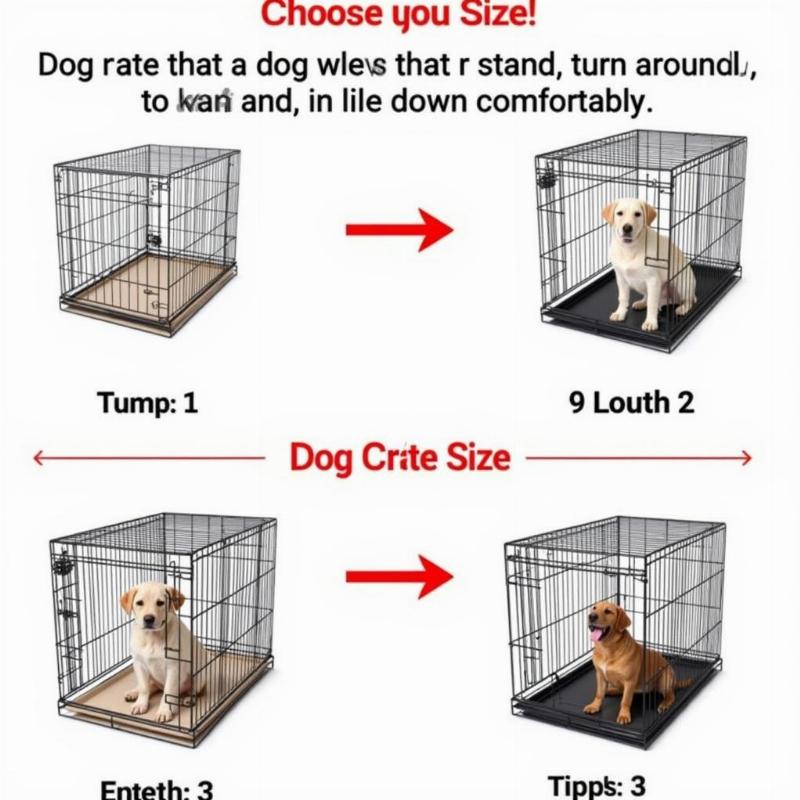Choosing the right crate size for your Labrador is crucial for their comfort and well-being. A crate that’s too small will be cramped and restrictive, while one that’s too large can defeat the purpose of house training. This guide will help you determine the perfect what size dog crate for a lab, ensuring a happy and well-adjusted pup.
Factors Affecting Labrador Crate Size
Several factors influence the ideal crate size for your Lab. Age, adult size, and even personality play a role. A growing puppy will need a different size crate than a fully grown adult. Similarly, a particularly energetic Lab might benefit from a slightly larger space.
Age and Projected Adult Size
Puppies grow quickly! You’ll need to consider your Lab’s projected adult size when choosing a crate. Measure your puppy’s length from nose to tail base, and add a few inches for growing room. This will give you a good starting point for crate size.
Personality and Behavior
While not as crucial as physical size, your Lab’s personality can influence crate choice. A more anxious dog might appreciate a smaller, more den-like space, while a playful Lab might prefer more room to stretch out.
 Choosing the right dog crate size for a Lab
Choosing the right dog crate size for a Lab
Measuring Your Lab for the Perfect Crate
Accurate measurements are key to finding the right fit. Here’s how to measure your Lab:
- Length: Measure from the tip of their nose to the base of their tail.
- Height: Measure from the floor to the top of their head while they are standing.
- Width: Measure across the widest part of their chest.
Add a few inches to each measurement to ensure enough space for your Lab to stand, turn around, and lie down comfortably.
Standard Labrador Crate Sizes
For adult Labs, a 42-inch crate is often a good fit. However, some Labs, especially males, may require a larger 48-inch crate. For puppies, you might start with a smaller crate and upgrade as they grow.
Choosing the Right Crate Type
Several crate types are available, each with its pros and cons. Wire crates are popular for their ventilation and visibility. Plastic crates offer more privacy and are ideal for travel. Soft-sided crates are lightweight and portable but less durable. Consider your lifestyle and your Lab’s needs when making your decision.
Crate Training Tips for Your Lab
Introducing your Lab to their crate should be a positive experience. Make it a comfortable and inviting space with soft bedding and their favorite toys. Start with short periods in the crate and gradually increase the duration. Never use the crate as punishment.
Conclusion
Choosing the correct what size dog crate for a lab is essential for their comfort and well-being. By considering your Lab’s age, size, and personality, you can find the perfect crate to help them feel safe and secure. Remember to measure carefully and introduce the crate positively to ensure a successful crate training experience.
FAQ
- How do I know if my Lab’s crate is too small? If your Lab can’t stand up, turn around, or lie down comfortably, the crate is too small.
- Can I use a crate that’s too big for my Lab puppy? A crate that’s too big can hinder potty training. Use dividers to adjust the space as your puppy grows.
- What type of crate is best for a Lab? Wire crates are generally recommended for their ventilation, but plastic or soft-sided crates might be better suited for specific needs.
- How do I clean my Lab’s crate? Regularly clean the crate with soap and water. Remove any bedding and wash it separately.
- What should I put in my Lab’s crate? A comfortable bed, a few toys, and a water bowl are essential.
- How long can I leave my Lab in their crate? Adult Labs can generally tolerate up to 8 hours in a crate, but puppies require more frequent breaks.
- What if my Lab whines in their crate? Whining can be normal initially. Ignore it unless you suspect your Lab needs a potty break.
Beautdogs.us is your premier resource for all things dog-related in the US. We offer expert advice on dog breeds, care, and products, catering to both new and experienced dog owners. Our mission is to empower dog lovers with the knowledge and resources they need to provide the best possible care for their canine companions. For more information and personalized advice, contact us at [email protected] or call us at +1 501-555-7529. Visit Beautdogs.us for a wealth of information on dog care, breed guides, and much more!